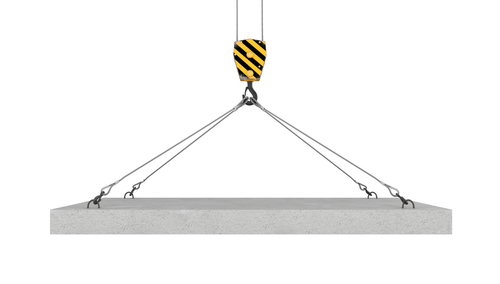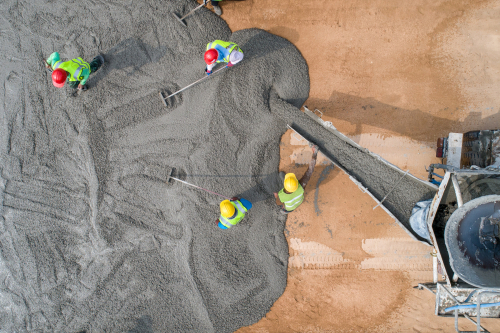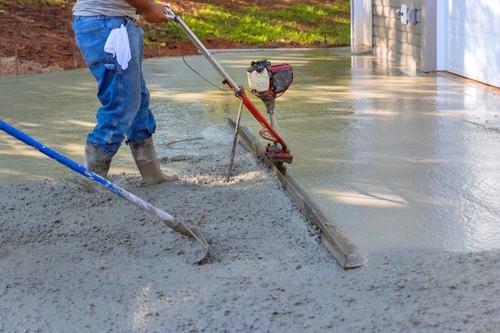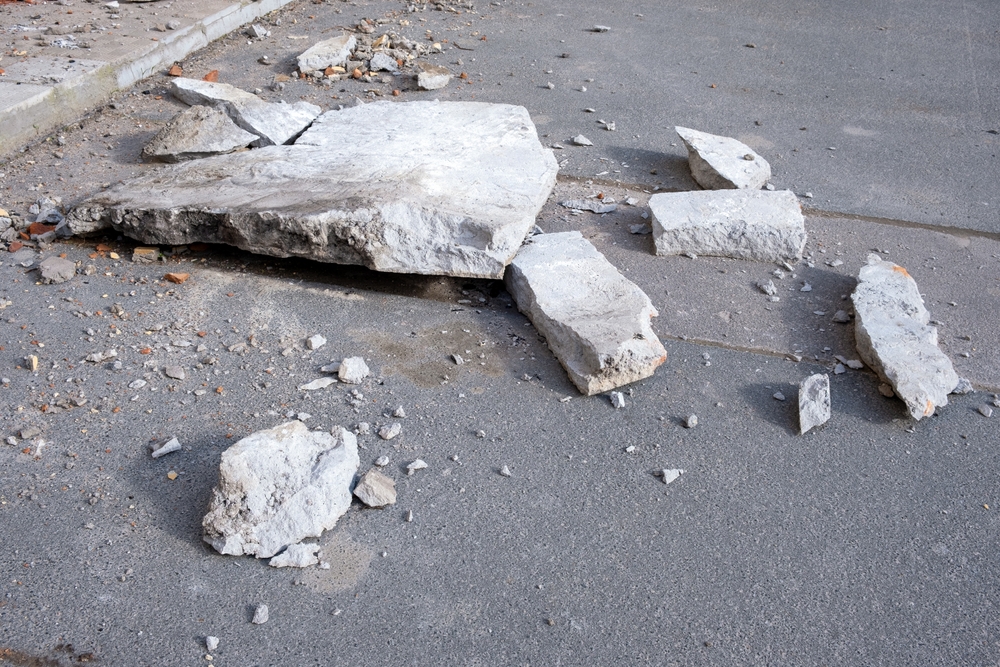June 7, 2024 - Benjamin Ehinger
Frequently Asked Questions About the Weight of Concrete
CALL NOW 844-762-8449
Understanding the weight of concrete is crucial for various aspects of construction, from structural calculations to transportation logistics. Concrete is a fundamental material in construction, known for its strength and durability. The weight of concrete, typically measured in pounds per cubic foot (pcf), can vary based on its composition and the types of aggregates used.
When dealing with construction projects, you frequently have questions regarding how these weights affect your overall plans. Knowing how to calculate the weight of a cubic yard of concrete is essential for determining load capacities of structures, estimating shipping weights, and considering load limits for transportation on roadways. It’s not just about knowing the figures; it’s about understanding the factors, like air content and moisture, which can influence these weights significantly.
Common questions on this topic may revolve around the distinctions between different types of concrete, such as lightweight and normal-weight concrete and how environmental factors may affect the weight and strength of the cured material. Consulting with resources like the American Concrete Institute can provide in-depth information regarding the influences and considerations that need to be addressed in your construction project.
 Concrete’s weight is influenced by its density and composition which includes materials like cement, aggregates, and water.
Concrete’s weight is influenced by its density and composition which includes materials like cement, aggregates, and water.
 When considering the weight of concrete, your attention should focus primarily on the characteristics of the aggregates used and the specific composition of the concrete mix. How these elements are proportioned and prepared impacts the final density and therefore weight of the concrete.
When considering the weight of concrete, your attention should focus primarily on the characteristics of the aggregates used and the specific composition of the concrete mix. How these elements are proportioned and prepared impacts the final density and therefore weight of the concrete.
 To calculate the cubic yards of concrete in your driveway, you first need to measure the length, width, and thickness of the slab in feet. Here’s a quick formula:
To calculate the cubic yards of concrete in your driveway, you first need to measure the length, width, and thickness of the slab in feet. Here’s a quick formula:
Remember, thickness should be tailored to your load requirements. If you’re considering a typical 4-inch thick driveway slab, then for a 10×20 foot area, you would need approximately 2.47 cubic yards of concrete. If you increase the slab thickness, say to 5 inches, expect to need about 20% more concrete.
Don’t forget that concrete is generally ordered to the nearest quarter yard, so you would round up the cubic yardage to account for variations in depth and ensure you have enough material for the project.
How Much Does Concrete Weigh?
 Concrete’s weight is influenced by its density and composition which includes materials like cement, aggregates, and water.
Concrete’s weight is influenced by its density and composition which includes materials like cement, aggregates, and water.
Understanding Density
The density of concrete is a crucial factor determining its weight. Density is typically measured in kilograms per cubic meter (kg/m³) or pounds per cubic foot (lbs/ft³). The density of standard concrete ranges between 2,300 kg/m³ to 2,400 kg/m³. This means that for each cubic meter of concrete, you can expect it to weigh between these two figures. To put this into more familiar terms, a cubic foot of concrete would roughly weigh about 150 lbs. Example of calculating weight:- For 1 cubic meter of concrete:
- Weight = Volume × Density
- Weight = 1 m³ × 2,400 kg/m³
- Weight = 2,400 kg
Concrete Composition
Concrete is composed of cement, aggregates – which include sand and gravel – and water. The aggregates typically account for most of the volume and significantly influence the weight of the concrete. Among these, gravel contributes more to the weight due to its higher density compared to sand. Cement, while smaller in volume compared to aggregates, also adds to the overall weight. The water used in the mixture evaporates as the concrete cures, but it does influence the initial weight. Proper proportioning of these materials is imperative to ensure the correct density and weight of the finished product. Typical concrete mix proportions by weight:- Cement : 13-15%
- Water : 14-18%
- Aggregates : 60-75% (varying densities)
Calculating Concrete Weight
Properly estimating the weight of concrete is crucial for project planning and logistics. You will need to understand standard measurement units and the use of concrete weight calculators to achieve accurate results.Standard Measurement Units
The weight of concrete is typically expressed in pounds (lbs) per cubic foot or in metric tons or kilograms per cubic meter. To calculate the weight manually, you’ll need both the volume of your concrete and its density. Concrete’s density can vary, but standard concrete is usually around 150 lbs per cubic foot or 2,400 kg per cubic meter. Here is a brief outline of the steps:- Measure the volume of your concrete structure:
- If you’re working with a slab, measure the length, width, and thickness and multiply them to find the cubic feet or cubic meters.
- For a cylindrical shape, calculate the volume by multiplying the area of the base (πr²) by the height.
- Find the concrete density, which varies by concrete type. A typical value for standard concrete could be 2,400 kg/m³ or about 150 lbs/ft³.
- Multiply the volume by the density to get the weight:
- Volume (m³) × Density (kg/m³) = Weight (kg)
- Volume (ft³) × Density (lbs/ft³) = Weight (lbs)
- 6 m³ × 2,400 kg/m³ = 14,400 kg
Using Concrete Weight Calculators
If manual calculation seems complex or if you require quick estimates, you can use a concrete weight calculator. These online tools are designed to do the math for you. Here’s how you can utilize them:- Input the volume of your concrete in cubic feet, yards, or meters.
- Select the type of concrete you’re working with, as some calculators offer different densities for different concrete types.
- The calculator will automatically compute the weight based on the given volume and selected concrete type.
Factors Affecting Concrete Weight
 When considering the weight of concrete, your attention should focus primarily on the characteristics of the aggregates used and the specific composition of the concrete mix. How these elements are proportioned and prepared impacts the final density and therefore weight of the concrete.
When considering the weight of concrete, your attention should focus primarily on the characteristics of the aggregates used and the specific composition of the concrete mix. How these elements are proportioned and prepared impacts the final density and therefore weight of the concrete.
Aggregate Types and Moisture Content
Aggregates, which consist of sand, gravel, or crushed stone, form the bulk of concrete’s volume and have a significant effect on its weight. The density of the aggregates themselves plays a crucial role; for instance, lightweight aggregates such as pumice will result in a less heavy concrete, whereas the use of denser aggregates like basalt will yield a heavier final product. Also, aggregates come with varying levels of moisture content, which affects the overall weight. Wet aggregates can contribute additional water to the mix, potentially affecting mix proportions and increasing the concrete’s weight. It’s critical to measure and adjust the water content accurately to maintain the desired water-cement ratio and achieve the right balance for your specific requirements.- Dry Aggregates: Lighter overall weight
- Wet Aggregates: Heavier overall weight
Concrete Mix Design
Your concrete mix design consolidates several components: cement, aggregates, water, and sometimes additives. The mix proportions of these components influence the unit weight of the concrete. A rich mix, for instance, with a higher cement content will be heavier due to the density of cement. Meanwhile, a mix with a higher ratio of lightweight aggregates will be lighter. The air content in concrete is another important factor. Entrapped air creates a lighter concrete, while a mix with minimal air will be denser and therefore heavier. The water-cement ratio affects not just the weight but also the strength and durability of the concrete. Too much water can make the concrete lighter but can also weaken the structure.- High Cement Content: Increases weight
- Higher Air Content: Decreases weight
- Water-Cement Ratio: Influences weight, strength, and durability
How Much Concrete can Fit in a Dumpster?
When planning to dispose of concrete, knowing the weight limits of dumpsters is crucial. Typically, you should not load a dumpster with more than 10 tons of material. The exact amount of concrete a dumpster can handle depends on its size and the limits set by the waste management company. Dumpster Sizes and Concrete Capacity:- 10-yard dumpster: Approximately 10 cubic yards of concrete without exceeding the weight limit.
- 15-yard dumpster: Can be filled with concrete up to the height of the dumpster sides.
- 20-yard dumpster: Can be loaded halfway with concrete.
- 30-yard dumpster: Should only be one-third full when disposing of concrete.
- Dry, aggregate mix: Can weigh over 3,000 pounds per cubic yard.
- Wet concrete: Each cubic yard may weigh around 4,000 pounds due to moisture content and mixture elements like cement and sand.
How many yards of concrete are in my driveway?
 To calculate the cubic yards of concrete in your driveway, you first need to measure the length, width, and thickness of the slab in feet. Here’s a quick formula:
To calculate the cubic yards of concrete in your driveway, you first need to measure the length, width, and thickness of the slab in feet. Here’s a quick formula:
- Cubic Yards = (Length × Width × Thickness) / 27
| Length (ft) | Width (ft) | Thickness (inches) | Cubic Yards |
|---|---|---|---|
| 20 | 10 | 4 | 2.47 |
What is the weight of one yard of concrete?
When you’re working with concrete, knowing its weight is important for logistics and structural calculations. A cubic yard of concrete’s weight can vary based on factors such as mix proportions, moisture content, and aggregates. For a standard mix, which includes a mix of cement, sand, aggregates (like gravel or crushed stone), and water, the weight generally hovers around 3,900 pounds. However, specific weights can differ depending on the materials used and their ratios. Here’s how the components can affect the weight:- Aggregates: Heavier aggregates can increase the weight, while lighter ones, like certain slags or pumice, may reduce it.
- Moisture Content: Wet concrete tends to weigh more due to the water content. Typically, it weighs between 4,000 to 4,050 pounds per cubic yard when wet.
- Air Content: Air entrainment can reduce weight, while a denser mix with less air might weigh more.
- Water-Cement Ratio: This ratio affects the density; a higher ratio means more weight due to extra water, whereas a lower ratio results in heavier concrete as it contains more cement.
What is the weight of 10 yards of concrete?
When you’re trying to determine the weight of 10 cubic yards of concrete, there are a few key factors that you need to consider. Each of these variables can slightly alter the final weight. Firstly, the weight of concrete is highly dependent on the mixture’s composition. Concrete is composed of cement, aggregates (like sand and gravel), and water. The density and proportions of these components affect the overall weight. A typical concrete mix comprises:- Cement: The binder in your concrete mix.
- Aggregates: They add strength and volume.
- Water: Reacts with cement to form the concrete.
- Air Content: Incorporated during mixing, affects density.
- Dry concrete: approximately 35,000 lbs or 17.5 tons
- Wet concrete: around 39,000 lbs or 19.5 tons
Are concrete and cement different?
Concrete and cement are often mistaken as the same material, but they are fundamentally distinct. Cement is a binder, a substance used for construction that sets, hardens, and adheres to other materials to bind them together. Think of cement as the glue that holds the ingredients of concrete together. Concrete, on the other hand, is a mixture composed of:- Aggregates: sand, gravel, or crushed stone
- Cement: the binding element
- Water: activates the cement and aids the mixture in curing
- Air content: tiny air bubbles that can improve freeze-thaw durability
RECENT BLOGS
Our Reviews
Glenda Lanier Prowell
1721758635
I have ordered an 11 yard dumpster to be delivered to my house.Lonier was extremely helpful and answered all my questions. The rate was very reasonable.
Cedric Smikle
1721660395
Amber was extremely professional and courteous. She answered all of my questions and even some that I didn’t know I needed to ask.
Cait Kaider
1721243051
I highly recommend Waste Removal USA for their responsiveness and how the staff work hard to provide exceptional customer service. They have done well by us and our clients. Thank you!
Easom Family
1721223306
Louiner Pierre-Louis Is awesome! Did a great job. Will definitely be using this same company for all my dumpster needs because of his awesome customer service! Thank you!!!
tabitha Vazquez
1720539988
Wonderful and fast customer service!
LATEST BLOGS





